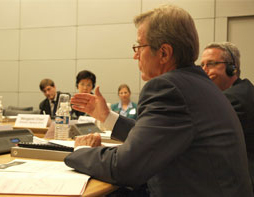 I have been eagerly awaiting this web link to the report of the Taskforce on Innovative International Financing for Health Systems.
I have been eagerly awaiting this web link to the report of the Taskforce on Innovative International Financing for Health Systems.
One of the major outcomes of the UN Millennium Development Goal Call to Action, high level event held in New York in September 2008, was the announcement by Gordon Brown of the Taskforce on Innovative International Financing. Co-chaired by Prime Minister Brown and World Bank President, Robert Zoellick. The taskforce's objective was to identify ways of raising additional money to help countries achieve improved health and progress towards the MDGs. The taskforce met to finalise the report on 5th March, but we have had to wait until now to get the final read out of this work.
Both President Guebuza and Mozambique's Health Minister, Dr. Garrido, participated in the New York UN Summit where the taskforce was launched. They went to the meeting to highlight the progress Mozambique has already made improving health, but also to highlight the outstanding challenges and the funding gap the country faces if it is to reach the MDGs. Mozambique is still trying to fill its financing gap and I recently posted a blog on the efforts the country is making to secure round 9 funding from the Global Fund, looking for a much needed injection of financing to increase health worker training and recruitment and expand access to services. Recommendation 7 of the taskforce really addresses this issue, highlighting the need for more efficient funding, through both existing and new funding channels to fill gaps in costed and agreed national health strategies.

A few months ago the headline figures for the additional funding needed to achieve the MDGs would have appeared extremely ambitious for those of us who find it difficult to think in terms of billions of dollars. The taskforce estimates that an increase in funding for health from $31 billion per year to $67 - 76 billion is needed to achieve the MDGs. With all the news recently of multi-billion dollar bail-outs, it’s become a little easier to think in terms of billions of dollars. And to be realistic, health will also need billions of dollars during the downturn if we are to keep up the progress made so far. With this extra money the taskforce is looking to raise, 4 million childhood deaths could be averted and 780,000 avoidable adult deaths could be prevented, including 322,000 deaths of women as a result of pregnancy.
Whilst we should not underestimate the challenge of mobilising these additional resources in a time of economic crisis, the task no longer seems impossible. DFID's commitment and timetable to progress towards the European Union (EU) target of allocating 0.7% of Gross National Income to development demonstrates that the UK remains firmly committed to keeping its promise. With the additional investment recommendations proposed by the taskforce report, which include a solidarity levy on airline tickets, the expansion of the International Financing Facility for Immunisation (IFFIm), and making it easier for rich individuals to make large scale philanthropic donations, hopes should remain high that the additional funds needed can be mobilised.

1 comment
Comment by Vinay posted on
Interesting blog, as always, Neil.
I too was looking forward to the report on innovative financing in health, given the quality of players involved. Sure it is nice we finally got to read it but one thing you don't mention in your blog - what did you think of it?!
On balance, I am disappointed with the outcomes for two reasons:
1. I can not find too much 'new' or 'innovative' in there; rather, it relies on scale-out of existing & successful innovations (e.g. GAVI and UNITAID). Whilst I agree this should occur, I was hoping for some truly fresh approaches and ideas.
2. It is far too loosely costed. Yes, big assumptions need to be made on take-up... but still, it does not leave me understanding, for example,
'If the G8 countries all undertook Option 1, we would raise $x billion'.
Therefore, because of the way it is presented, it is impossible to know how much of the $36-45 billion PER ANNUM needed can be raised by take-up of these ideas.
Whilst this has been an important effort, I don't think the ideas presented by this Taskforce, sadly, will adequately fill the funding gap in health which is so desperately needed.